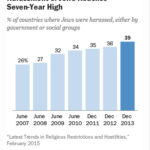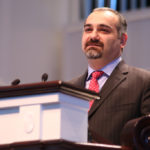WASHINGTON (RNS)—The New Year’s Day massacre at a Coptic church in Egypt. Christian converts facing the death penalty in Afghanistan. Swastikas painted on a Jewish synagogue in Venezuela.
As the headlines deliver fresh stories of the persecution of the faithful, two recent reports by watchdog groups and a new book take a fresh look at the persistence of religious intolerance worldwide, with Muslim-majority nations facing particular criticism.

More than 1,000 Coptic Christians demonstrated in downtown Nashville against the shooting deaths of six Coptic Christians and other instances in Egypt of violence and persecution against their ancient Christian community. (PHOTO/Baptist Press/Art Toalston)
|
“Religious persecution is not only more prevalent among Muslim-majority countries, but it also generally occurs at more severe levels,” Roger Finke and Brian J. Grim write in their new book, The Price of Freedom Denied, published by Cambridge University Press.
Finke and Grim drew on annual reports by the U.S. State Department to conclude that religious persecution plagues all regions of the globe.
Studying 143 countries, they found:
• In 86 percent of countries, people were physically abused or removed from their homes based on their religion.
• High levels of government restrictions on religion were found in 78 percent of Muslim-majority nations, compared to 10 percent of Christian-majority nations and 43 percent of other nations.
But nothing inherent in Islam makes Muslim-majority countries poor guardians of religious freedom, Finke said, and Muslims themselves often are victims of religious intolerance.
“As Westerners, we view Muslims as targeting us or other Christians. But when you look within these countries, much of the persecution is Muslim on Muslim,” said Finke, a sociologist of religion at Penn State.
“It’s a battle over what type of Shariah law should be enacted, or who holds the reins of power in government.”
Sign up for our weekly edition and get all our headlines in your inbox on Thursdays

|
Open Doors, a California-based evangelical group that defends Christian rights globally, also cites Muslim-majority nations as particularly hostile in its recent list of the most dangerous countries in which to practice Christianity.
While North Korea tops the list for the ninth consecutive year in the Open Doors report, eight of the top 10 offenders are Muslim-majority nations. North Korea is followed by Iran, Afghanistan, Saudi Arabia, Somalia, Maldives, Yemen, Iraq, Uzbekistan and Laos.
Open Doors President Carl Moeller said he particularly is concerned about increasing violence against Christians in Iraq and Afghanistan. Iraq broke into the top 10 for the first time, up from No. 17, and showed the most dramatic deterioration for Christians.
“These are countries we sought to bring freedom to, and they don’t enjoy the most basic freedom we have in our country—religious freedom,” said Moeller, whose group devised a 50-question survey to rank countries.
A new report focusing on the most vulnerable religious communities in the world was released by the non-denominational First Freedom Center. In “Minority Religious Communities At Risk,” the Richmond, Va.-based group identifies groups threatened with extinction within a decade.
They are, according to First Freedom, Orthodox Christians in Turkey, Jehovah’s Witnesses in Eritrea, Jews in Arab lands, Jews in Venezuela, Nazarene Chris-tians in Somalia, Masalit Muslims in Sudan and Sabian Mandeans (a Christian sect) in Iraq.
Relying on the State Department’s religious freedom reports and other sources, First Freedom, like Open Doors, calls attention to the growing violence against religious minorities in Iraq and Afghanistan.
The group’s president, former Ambassador Randolph Bell, said the report bolsters his view that protecting religious freedom must be integral to U.S. peacekeeping operations.
“Whenever we try to stabilize situations in countries like Afghanistan, Iraq, Somalia or Nigeria, if we do not take into account the rights of religious minorities, peace will not last,” Bell said.
News Elsewhere:
Copts say Egypt regime change trumps Islamist fears (02/02/11)
An Egyptian Coptic Orthodox church source said the church will advise Copts not take part in the latest protests, but will not stop those who insist on taking to the streets.
Unrest in Egypt: Terry Mattingly wonders why media haven't mentioned the Copts in reference to the latest protests in Egypt.














We seek to connect God’s story and God’s people around the world. To learn more about God’s story, click here.
Send comments and feedback to Eric Black, our editor. For comments to be published, please specify “letter to the editor.” Maximum length for publication is 300 words.